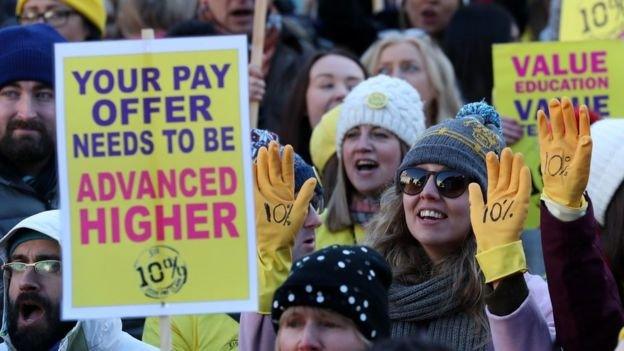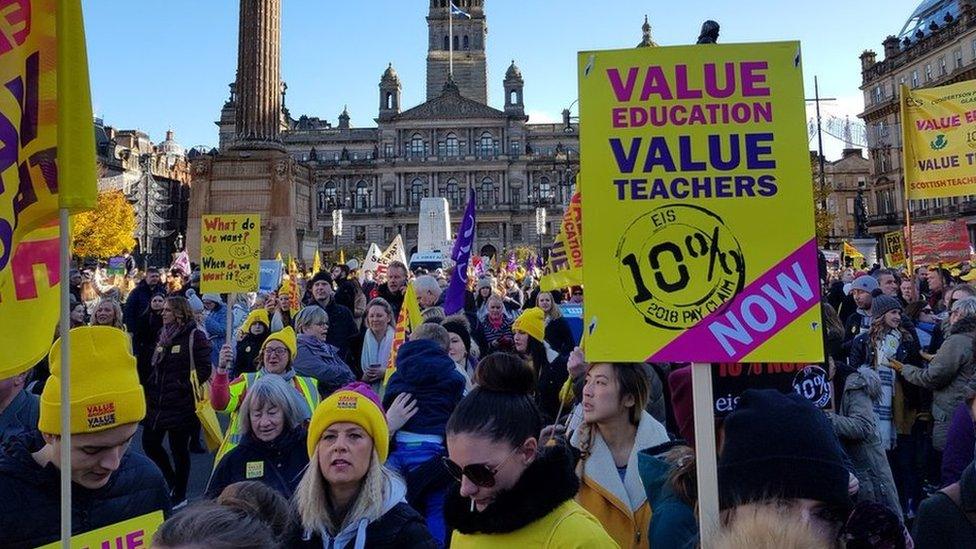Teachers' strike action over pay is 'very likely', says union
- Published

The unions want a 10% pay rise for all teachers
One of Scotland's biggest teaching unions has warned it is "very likely" that teachers will take strike action after rejecting a "final" pay offer.
The Scottish Secondary Teachers Association said its members had sent a "strong message" to the government.
The Scottish government had offered a headline 3% rise, with bigger increases for staff on lower grades.
Council body Cosla said the unions' demand for a 10% increase could not be met in a single year.
But Seamus Searsson, general secretary of the SSTA union, said an improved offer must be made to avoid a teachers' walk-out.
He told the BBC's Good Morning Scotland programme: "Unless the government is willing to come to the table and make a reasonable offer, I think that is very likely.
"Teachers have suffered a 24% pay cut (in real terms) over the last 10 years. This is just a step forward to try to restore teachers to where they should be."
Education Secretary John Swinney said he was disappointed by the rejection of a "strong and fair" offer.
The SSTA and Scotland's other main teaching union, the EIS, insist a big rise is needed to boost recruitment and retention of staff.
Last month, thousands of teachers marched in Glasgow in support of a "fair deal" that would "value teachers".

Thousands of teachers marched in Glasgow last month
The education secretary has said the current offer would give the majority of staff a rise of between 5% and 11% once restructuring and pay progression were factored in.
But the SSTA's Seamus Searrson criticised the "divisive nature" of the offer.
He said: "We are all teachers, we're all working together. Why should there be a division between one grade and another?
"The employers and the government walked away from the negotiating table back in October. That is why we had to go down the road of having a ballot - because they said there was no further room for negotiation.
"We're ready for negotiation but we do need the government and the employers to come to the table, be realistic and try and plan for the future."
'Landmark result'
The EIS said 98% of members who voted rejected the offer, with a turnout of 74%. In the SSTA ballot, 97% rejected the deal, on a 73% turnout.
EIS General Secretary Larry Flanagan said the "near unanimous" rejection of the pay offer was "a landmark result".
He added: "It is one of the strongest rejections of an offer in EIS history, and one which is indicative of the current mood of Scotland's teachers, increasingly agitated on pay but angry also at excessive workload, mainstreaming on the cheap, and austerity driven cuts to resources."
A third teaching union, the NASUWT, said a survey of more than 1,000 of its members suggested more than half were willing to take industrial action in support of the claim.
The unions said they hoped to make progress through negotiation, but the EIS warned it could ballot for industrial action in the New Year if an improved offer was not made by Christmas.
'Appetite for resolution'
The SSTA's Seamus Searsson added: "Remember, teachers don't want to take strike action - they want to get on with their day job and teach children.
"So this is a distraction and we need to get past this, get teachers back into schools and recruit and retain the teachers that we've got."
Gail Macgregor, resources spokeswoman for Cosla, said: "The trade unions claim for 10% increase in one year cannot be met within the resources we currently have available."
Mr Swinney, who is also the deputy first minister, said: "What disappoints me about this is the fact that it was such a strong offer, with teachers on the main pay grade scale receiving between 5% and 11%.
"But we will of course engage in further discussion with the teaching trade unions about these issues with an appetite to get to a resolution."
- Published20 November 2018
